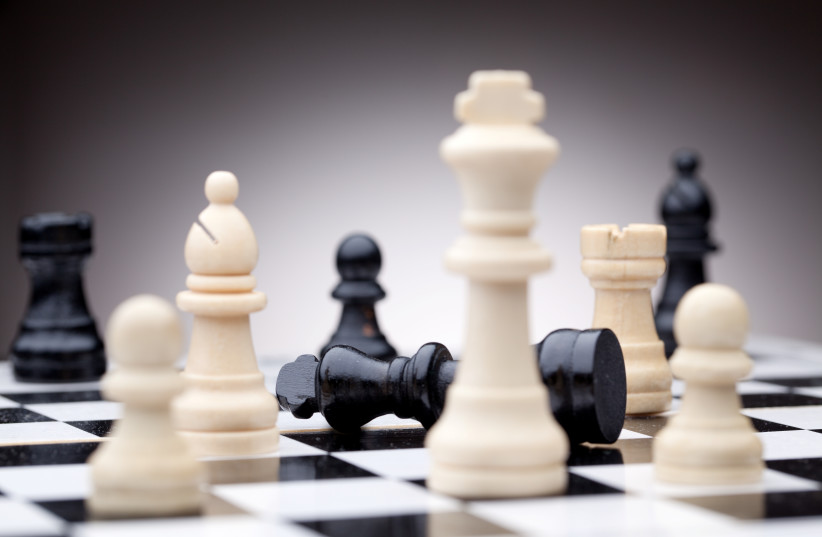No other game or sport was shaped and influenced by Jews in such a significant way as chess. The list of Jewish (and Jewish father) chess grandmasters – the highest title awarded by the World Chess Federation (FIDE) – is long, as is the list of Jewish world chess champions (5%).
Outstanding Jewish chess players like Garry Kasparov, Bobby Fischer and Emanuel Lasker have gone down as legends in the history of chess.
Most recently, the reigning World Chess Champion GM (Grandmaster) Magnus Carlsen, was challenged by the Jewish GM Ian Nepomnjaschtschi (“Nepo”) at the FIDE World Championship 2021 in Dubai but Magnus Carlsen managed to defend his title and keep the crown of the world chess champion.
Nevertheless, Carlsen stated before the championship: “Today, Nepomnjaschtschi is one of the few capable of defeating me.”
According to ChessBase, Beersheba is the city with the world’s highest rate (as of 2005) of chess grandmasters per capita – one GM for every 22,875 residents. These statistics left many people speculating as to whether there is some particular reason that so many of the greatest chess players were or are Jewish.

What is the connection?
Some attribute the outstanding success of Jewish chess players to the intensive study of the Talmud cultivated in Judaism for thousands of years and compare the way of thinking in chess with Talmudic thinking. In fact, chess and the Talmud’s approach have some things in common: Every situation is examined and analyzed down to the smallest detail and creative solutions and ways out have to be found within a limited framework of laws and rules.
According to Gerald Abrahams (1907-1980, British chess player and author), a love of learning, determination and a gift for languages (due to migration) also contribute to success. But the history of chess in Judaism begins much earlier.
The liberal scholar Aharon Yellinek (1820-1893) claims that chess was invented by none other than King Solomon, the wisest man of all time, and that he played the Game of Kings against his royal colleagues (Beit HaMidrash, a collection of small Midrashim from 1853-1877).
While this legend sounds beautiful and King Solomon certainly would have been capable of inventing this brilliant game, this fact is not mentioned anywhere in traditional Jewish literature and it is very likely that Yellinek composed this work based on his imagination for entertainment only.
While chess is not associated with King Solomon in traditional Jewish sources, it may be mentioned in the Talmud. In Ketubot (61b) a game called “Nadreshir” is brought into the discussion. Rashi (Rabbi Shlomo Yitzhaki 1040-1105) identifies the mentioned game as “Ishkekish,” an old French word for chess.
According to Rabbi David Korinaladi (18th-century Italian rabbi and author of Beit David, a Mishna commentary), it was invented even before the Mishna period. However, there are numerous historians and rabbis who, for various reasons, believe that neither Rashi nor the Talmud means chess.
SOMEONE WHO definitely knew this game and even mentioned it in his work is the well-known Spanish scholar and philosopher, Rabbi Yehuda HaLevi (1075-1141), the author of The Kuzari, who wrote: “For the same reason, it is unlikely that the weaker chess player should beat the strong. One cannot speak of luck or misfortune in a game like chess. For the rules of the game are quite open to study, and the expert will always be victorious.” (Kuzari 5:20,52)
The same is true for us, states Rabbi Yehuda HaLevi, man has a free choice between good and evil and it is incumbent on man to use his reason to make the right decisions rather than relying on luck. Rabbi Yehuda HaLevi’s son-in-law, the poet and philosopher Rabbi Avraham Ibn Ezra (1089-1167), was a passionate chess player, to the point that he wrote several poems about chess.
In his poem “The Song of Ishkuka,” he describes the rules of the game and the movement possibilities of each figure. Some of the rules in modern chess are based on the Ibn Ezra´s writings.
There has been much debate in the halachic works of the last few centuries as to whether it is permissible to play chess on Shabbos, and some halachic authorities held that it is inappropriate and possibly even forbidden. However, Rabbi Yehoshua Neuwirt states that it is permissible as long as the laws of borer (sorting) are observed (Schmirat Shabbat Kehilchata 16:34).
Interestingly, in the Chabad movement, chess has even a spiritual meaning. After Chabad Hassid and professional chess player Samuel Reshevsky became chess champion in the USA in 1946, Rabbi Yosef Yitzhak Schneersohn, the sixth Lubavitcher Rebbe, revealed to his followers (among them Samuel Reshevsky) the spiritual meaning behind this mysterious game. Chess symbolizes the ongoing struggle between kedusha (holiness) and the sitra achra (evil instinct) and the various figures stand for different instruments used in this battle.
In Chabad, there is a custom of playing chess on the “Nittel-Nacht” (night of December 24) and there is a well-known picture showing Rabbi Yosef Yitzhak Schneerson and his son-in-law Rabbi Menachem Mendel Schneerson (seventh Lubavitcher Rebbe) playing chess against each other.
Chess has accompanied mankind for thousands of years. In the last two years, due to COVID-19 and the series The Queen’s Gambit, the game has grown in popularity and according to chess.com, around 11 million new users have registered since March 2020.
Chess has always had a special place among the Jewish people and the extraordinary attention paid to chess by medieval scholars is a mystery, as is the great success of Jewish chess players over the past two centuries. What is clear is that it might take some time until there will be a Jewish chess player at the top of the chess world (again).
The writer, a rabbi, was born in Dnepr, Ukraine, and grew up in Germany. He currently lives in Berlin and teaches at the Hildesheimer Rabbinical Seminary.
